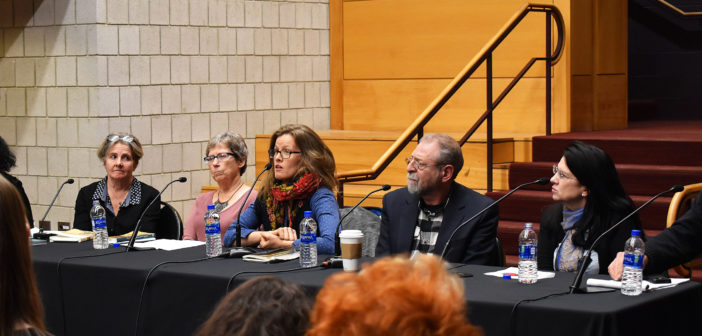At the age of 7, Lehigh alumna Lori Soderlind, ’86, launched her writing career with an essay about the marriage of her two stuffed mice.
However, at the Writing Life: Inspiration and Invention panel discussion on Tuesday, Soderlind said she thinks authors don’t have much to write about until they have gathered years of life experience.
Soderlind is the director of the masters of fine arts in creative writing program at Manhattanville College and was one of the six writers on the panel who discussed their personal inspirations and writing processes.
Joining Soderlind was poet and Lehigh associate professor of English Bob Watts, fiction writer Mary Troy, playwright Anisa George, poetry and fiction writer Lee Upton, and producer and novelist Jeff Diamond, ’72.
Stephanie Powell Watts, the director of Lehigh’s creative writing program, moderated the panel. Ten years ago, she and Zoellner artistic director Deborah Sacarakis created Notations, a series that showcases different writing forms.
Powell Watts said while Notations has brought plenty of writers and Q&A events to campus, this is the first time the series has included a panel. She said she plans to incorporate a panel into Notations each year.
Powell Watts, who found success last year with her first novel, “No One Is Coming to Save Us,” received the NAACP Image Award for Debut Author of an “Outstanding Literary Work.”
Powell Watts said she started to draft a book approximately eight years ago about a family in North Carolina that had faced a tragedy. Her idea was based on an actual event she discovered while researching the furniture industry in the South.
She wrote a draft of the novel, but said she wasn’t in love with the piece.
“A couple of years into writing that story, I started thinking that maybe my story wasn’t about that moment where everything in your life falls apart,” she said. “I was thinking that maybe my story was instead about the aftermath — what happens after you’re dealing with something for many years.”
After this realization, she took her story in a different direction and wrote what became “No One Is Coming to Save Us.”
Watts said the writing process involves experimentation and starts and stops along the way.
“It’s like anything else that you really want to see the end of,” she said, “you just have to take it step by step.”
Diamond reinforced this message of perseverance during the panel discussion.
“It’s the discipline that gets you from one page to the next and from one chapter to the next,” he said.
Just as the process of writing a creative work follows a winding path, each of the panelists entered his or her writing career differently.
Diamond, who studied history at Lehigh, worked in television news for 40 years prior to entering the publishing world in 2015 with his first murder mystery, “Live to Air.”
Watts, on the other hand, said he always knew he wanted to be a writer. However, he studied and worked in business before earning his masters in creative writing from North Carolina State University.
Troy, who also didn’t pursue creative writing until later in her career, said she would have not been skilled as a young writer.
“If I had started writing when I was young, I don’t know, I think I would’ve ended up a plumber,” she said.
In addition to sharing how they became writers, the panelists answered questions from the audience about the writing process and aspects of writing.
Watts talked about how poems must be crafted, and language is the only tool that can be used to build poetry.
“Art is more than the ability to evoke (emotion),” Soderlind said, “and that’s where craft comes in.”
Watts said he tells his Introduction to Poetry class to think of the course as a shop class for poetry.
Powell Watts said she was excited about this panel in particular because it featured two Lehigh alumni. She thinks the inclusion of Lehigh graduates in the panel was especially inspiring.
“The idea that somebody made the same decisions that you made and they have seen the formation of a certain kind of dream is really exciting,” she said.






Comment policy
Comments posted to The Brown and White website are reviewed by a moderator before being approved. Incendiary speech or harassing language, including comments targeted at individuals, may be deemed unacceptable and not published. Spam and other soliciting will also be declined.
The Brown and White also reserves the right to not publish entirely anonymous comments.